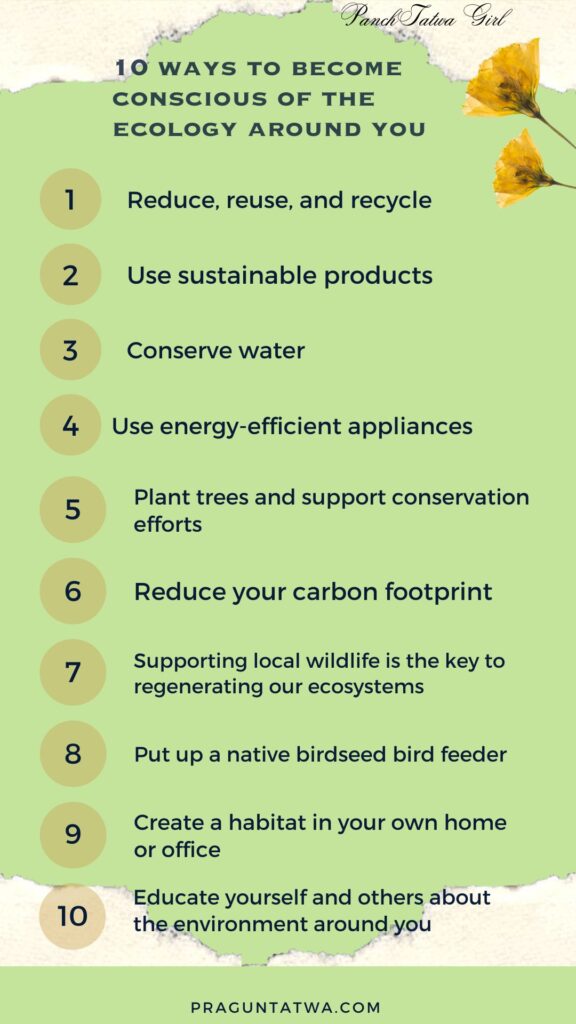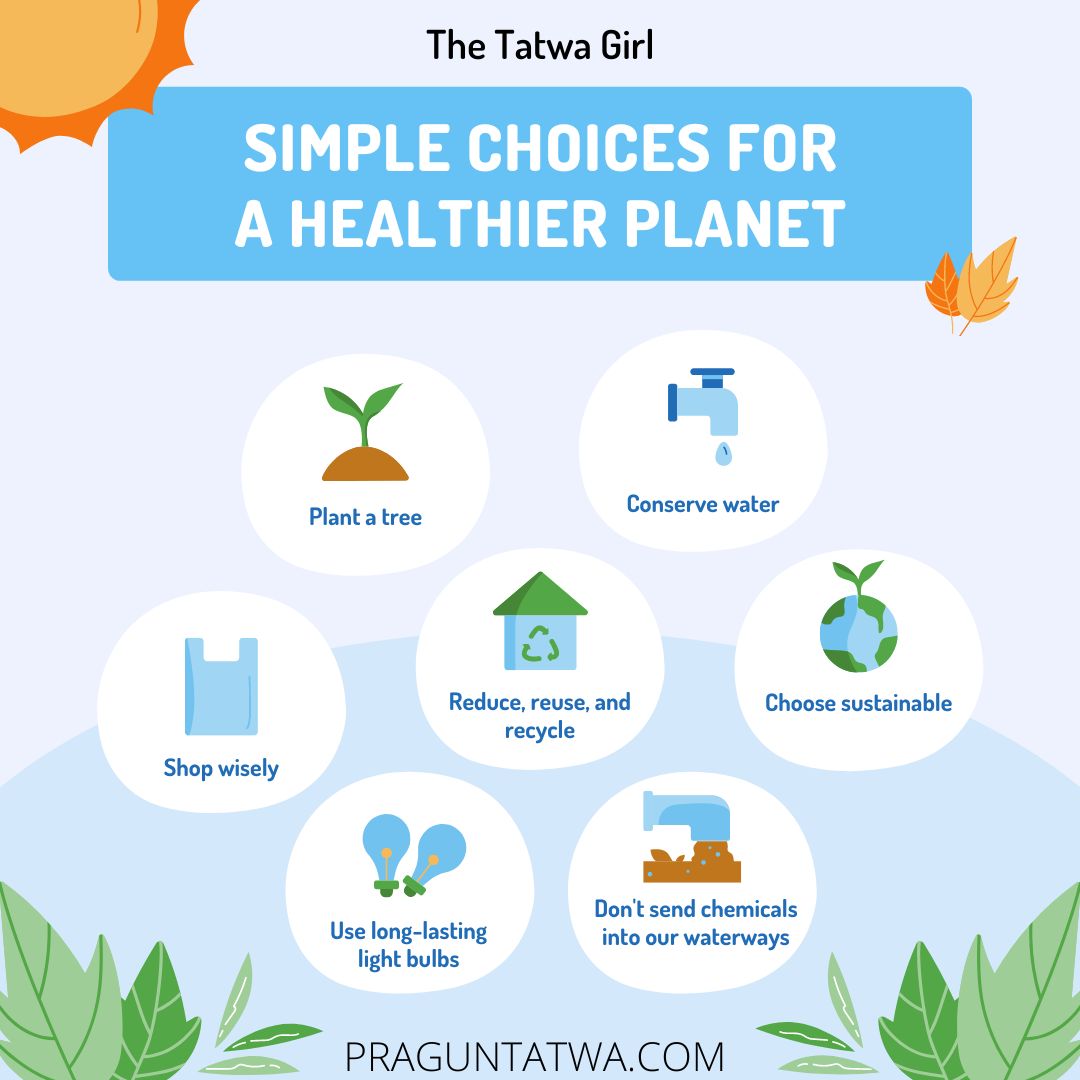Are you looking to Reduce Waste and not sure how to do it? Living greener doesn’t always require drastic change, like moving to a treehouse or foraging for herbs. All it takes is a few small tweaks in your daily living to Reduce Waste count by a significant amount.
Here are 10 Tips, tricks, and tweaks to start living sustainably-
ReUse – Carry your containers and bags
Canvas bags are a treehugger’s staple. Avoid plastic altogether by always carrying a reusable bag or tote. We now have lightweight foldable cloth bags that are compact enough to carry in your purse or car. Don’t feel ashamed to carry bags as well as jars or containers when you are out for bulk shopping.
Eco-Tip: Keep reusable bags, and cloth bags in handy places. Near the front door, inside the car dashboard, in your purse, just beside the key holder. This way it’s easy to grab them any time you go shopping.
Reusable Water Bottle
Reusable water bottles are probably the easy step to sustainability. Purchasing a reusable water bottle you can fill up anytime, anywhere will save you money and reduce your carbon footprint.
Eco-Tip: If you’re feeling guilty about the plastic water bottles you’ve accumulated over time, don’t fear. There are plenty of DIY projects that transform your plastic bottles into something new and useful.
Avoid disposable plastic
Disposable plastic containers are a huge problem for the environment. Plastic waste clogs our oceans and endangers wildlife. Plastic takes a very long time to break down, and when it eventually does, it releases harmful toxins into the water and soil. Some easy ways to cut out single-use plastic from your life are to buy grocery items in bulk rather than in single-serving containers, use refillable containers and reusable bags whenever possible, avoid plastic straws and tableware, and choose products with recyclable cardboard instead of plastic packaging.
Take your own and if you forget one use a box – most supermarkets have plenty of them as their products come packed in them.
Yes, the disposable quality of paper products is convenient, but you just end up with avoidable waste. Napkins, paper towels, and cleaning wipes can all be replaced with microfiber cloths, old t-shirts, huck towels, and cloth napkins.
Eco-tip: Keep a bin under the kitchen sink where you can easily toss dirty, used clothes and then throw them in with the rest of the laundry.
Repair If you can
We create waste by throwing away items that can be repaired. Do you find yourself tossing out piles of clothes each year? Try picking up some simple mending skills. The same goes for electronics, appliances, and furniture. In the age of online tutorials, it’s never been easier to learn how to fix something. You can also Reduce Waste by making smarter purchases. Rather than buying cheap products that need to be replaced frequently, invest in high-quality products from the beginning. These products will last longer and are built to be repaired rather than replaced. If you don’t know how to do it yourself, don’t be afraid to call a repairman. The next time you go to throw something out, give a second thought to fixing it instead.
It’s an interesting concept, trash, isn’t it? We ‘trash’ things that are no longer useful in any way – they simply have to be buried or burned. But is that the only option? Of course not! One way to Reduce Waste production is to recycle your waste instead. A great majority of the things we throw in the trash can be sorted, composted, or recycled in some other fashion. Before you toss something next time, ask yourself if you can use it again somehow!
Going green doesn’t mean sacrificing personal hygiene. Try a bamboo compostable toothbrush as a substitute for a plastic one, and organic, vegan makeup in place of drugstore brands.
Eco-Tip: Also make sure the packaging is recyclable when purchasing eco-friendly toiletry products.
Buy only what you need
When we’re in the grocery store, our eyes are often bigger than our stomachs. This leads to lots of unnecessary food waste due to overbuying. One way to make sure you only buy as much food as you can eat is to plan your meals ahead of time. Come up with a loose weekly “menu” and incorporate leftovers as much as possible. By keeping an inventory of what’s currently in your fridge, you’ll be able to reduce what you buy. Planning your meals might take a little extra time, but mealtimes will be much less stressful and your pocketbook will thank you in the end.
Buying in bulk is a great way to reduce packaging waste, save money, and try new foods in small quantities. Bulk stores are usually made up of rows of bins with scoops for you to ladle out your desired amount. In many bulk stores, you can buy grains, cereals, dried fruit, herbs, toiletries, cleaning products, and even oils and kinds of vinegar.
Eco-Tip: Only buy as much as you can use before it goes bad. As a precaution, see if you can sample an item before you fill up.
Recycle as much as you can
Okay, it may seem a little gross, but it’s worth taking a few minutes one day to rifle through your trash bin. See what types of packaging and products you seem to be throwing out most – this is where you should focus your waste-reducing efforts. Choose eco-friendly and green packaging material if you need it.
Eco-Tip: While you’re down there ransacking your trash bin, double-check to see if the items you’re throwing out are recyclable. Toilet paper rolls, non-aerosol deodorants, and cooking oil bottles are just some items people mistake for non-recyclable.
DIY – Be Creative
No need to buy name-brand products for cleaning your home when you probably already have the ingredients to make them yourself. Effective all-purpose cleaners can be made with vinegar, water, and baking soda. Different natural ingredients can be added to make detergent, window cleaner, and toilet cleaner as well. Just keep a refillable spray bottle and mix up a new batch when you run out. This will save you from buying a new bottle every time, and you’ll be using less harmful chemicals around your house.
If you’re feeling especially ambitious, try making your hygiene products at home. Soaps, toothpaste, and even deodorants can be made using only a few natural ingredients, like coconut oil and baking soda. This goes for spa treatments, as well.
Eco-Tip: If you’d like a nice scent or taste to compliment your DIY creation, try a few drops of aromatic essential oils, like peppermint, sandalwood, or lavender.
Grow your own food
The last great way to Reduce Waste production is to grow your own food. This means fewer plastic bags at the store, less packaging, and less demand for transport and farmland. Start a small organic garden in your backyard and use the compost from your food waste to keep it healthy!
Yes, the big “C.” Composting may sound like a practice limited to only the truest of treehuggers, but, in fact, it’s quite easy and requires very little time, effort, and space. The process involves upcycling leftover food and organic matter to make a dark, rich substance known as humus, often used as a conditioner for soil. Keep a small bin on your kitchen counter where you can easily dump food scraps (including fruit, vegetables, eggshells, and coffee grounds).
Eco-Tip: Different lifestyles call for different composting methods. If you’re an avid gardener with a backyard, you can use the compost for your garden. If you live in a city that doesn’t offer curbside pickup, you might be able to donate your compost to a community garden or nearby farm.
Paper Free
These days, most companies offer the option to receive bills via email or through an online account. Checking this box means cutting out a lot of unwanted mail and paper waste – much of which you probably throw out without opening it anyway.
Eco-Tip: To avoid receiving paper-heavy pamphlets and promotional materials as well, pop a ‘No Circulars’ sign on your mailbox.
Waste Warrior
Often, people simply toss their old electronics, clothes, or other miscellaneous items into the trash. Not only is this bad for the environment (especially the electronics), but it is also bad for anyone trying to be sustainable. See if you can get your items repaired, and if you can, do so and donate them. If it’s too expensive, take your waste to the proper disposal plants. Clothes, on the other hand, should always be donated if they’re in good condition (otherwise, you can make reusable bags out of them!).
If we approach sustainable living intending to Reduce Waste, we reduce the need to reuse and recycle, as well. By reducing our consumption, we can stop the cycle of waste before it even gets started. Following the Reduce Waste ideas from above, try to avoid using any single-use one-time, disposable items. This includes diapers, napkins, sponges, and washcloths.

From My Green Bag
To sum up, This is my conscious lifestyle post to spread more awareness about sustainable living and Reduce Waste. Join me for more such ways and tips and become part of my Conscious and sustainable living journey. Keep visiting my blog to make yourself eco-friendly, aware of conscious and sustainable choices be more concerned for our environment, and alter your lifestyle.
To add on, read and listen to my Green Talks series and check out interviews with Eco-conscious people who are trying their bit towards conscious and sustainable living practices. There is so much to learn and explore from all of them I have interacted with, do listen and drop in your views in the comments. Check here to learn more about all the Eco-Friendly dates.
Being Eco-Friendly is not a choice, make it a habit.
Without a doubt, sustainability is easier than you think. You don’t have to jump in by changing everything, start small to make the changes more eco-friendly, sustainable and a part of your daily life.

Leave a Reply